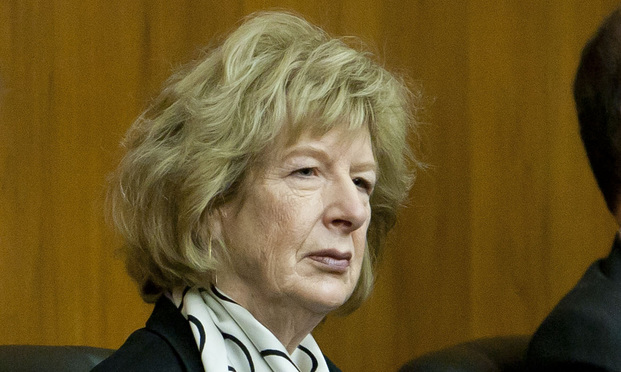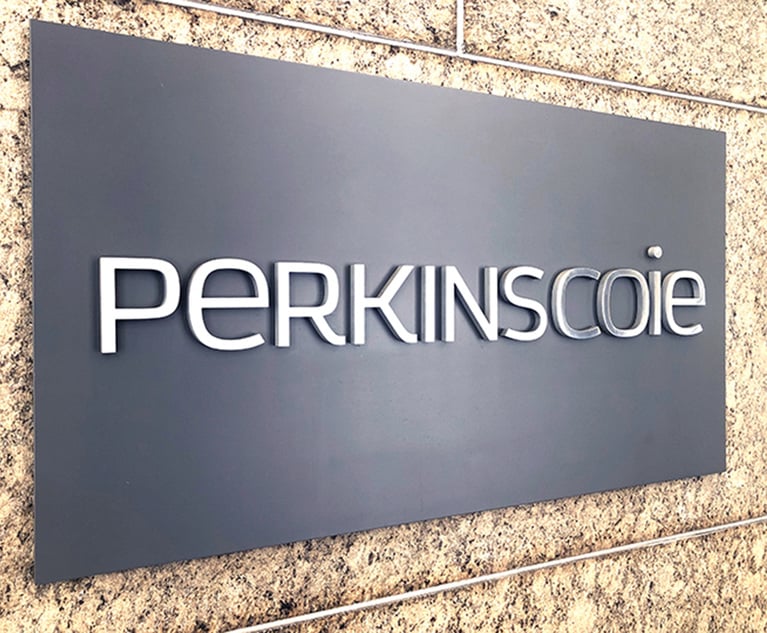En Banc 4th Circuit Revives Emoluments Lawsuit Against Trump
"Allowing the president to be the final arbiter of both the interpretation and enforcement of the law—as the dissents would—would gravely offend separation of powers," the court's majority opinion states.
May 14, 2020 at 09:13 AM
6 minute read
 Judge Diana Motz. Credit: Diego M. Radzinschi / ALM
Judge Diana Motz. Credit: Diego M. Radzinschi / ALM
The U.S. Court of Appeals for the Fourth Circuit ruled en banc to allow a lawsuit that alleges President Donald Trump is violating the Constitution's Emoluments Clause to advance.
In the rare full-court ruling Thursday, the judges found Trump did not have the ability to ask the federal appeals court to dismiss the lawsuit, as he claimed immunity from the legal challenge while in office.
"The president maintains that the district court committed multiple errors that we should correct; however, this case is not on appeal," Judge Diana Motz wrote in the court's majority opinion. "We recognize that the president is no ordinary petitioner, and we accord him great deference as the head of the executive branch. But Congress and the Supreme Court have severely limited our ability to grant the extraordinary relief the president seeks."
A three-judge panel on the circuit ruled last year to throw out the suit, finding the Maryland and D.C. attorneys general didn't have standing to bring forward the claims over Trump's Washington, D.C., hotel. The complaints allege that Trump is violating the anti-corruption clause by profiting off his private businesses while in office.
But the Fourth Circuit later agreed to grant a rare en banc rehearing of the case, giving the emoluments claims a second chance in court.
In Thursday's majority opinion, Motz wrote that Trump had not fulfilled the legal requirements needed for the form of legal relief he wanted, a writ of mandamus to either certify an interlocutory appeal challenging an order against the president's motion to dismiss or to dismiss the complaint.
Trump's attorneys had argued the district court's ruling was a "clear abuse of discretion" and therefore qualified him for the appeal. However, the majority opinion says that argument "has been repeatedly rejected by the Supreme Court."
The majority opinion also rejected Trump's request to throw out the complaint. Motz wrote the court recognizes the attorneys general "press novel legal claims. But reasonable jurists can disagree in good faith on the merits of these claims."
"The president's insistence that 'emoluments' indisputably include only 'profit arising from office or employ' (that is, payment for services rendered in performance of a formal job), while possible, is certainly not indisputable," the judge wrote. But Motz noted that attorneys for D.C. and Maryland had pointed to other legal opinions that back up their definition of the term—any profits Trump receives from foreign or domestic entities through his businesses—as well as a number of amicus briefs filed in the case in their favor.
"Given this history, we can hardly conclude that the president's preferred definition of this obscure word is clearly and indisputably the correct one," the opinion reads.
The court further rejected Trump's claims that allowing the case to survive would expose him to "intrusive discovery," calling the argument "puzzling" because the president "has not petitioned for relief as to any discovery order."
And the judges rejected Trump's argument that a court can't review his emoluments-tied actions, saying they "collapse under scrutiny."
"The duty to obey these particular laws—the Constitution's Emoluments Clauses—flows from the president's status as head of the executive branch, but this duty to obey neither constitutes an official executive prerogative nor impedes any official executive function," the opinion reads.
"The Framers, concerned about the corrosive effect of power and animated by fears of unduly blending government powers, dispersed the authority to enforce the law and the authority to interpret it. To hold otherwise would mean that the president alone has the ultimate authority to interpret what the Constitution means," Motz wrote. "Allowing the president to be the final arbiter of both the interpretation and enforcement of the law—as the dissents would—would gravely offend separation of powers. Rather than sanction an 'assault by the judicial branch against the powers of the executive,' our holding affirms the separation of powers principles dictated by the Constitution and endorsed by centuries of foundational jurisprudence."
Chief Judge Roger Gregory and Judges Robert King, Barbara Keenan, James Wynn Jr., Albert Diaz, Henry Floyd, Stephanie Thacker, and Pamela Harris all joined the majority opinion. Wynn wrote a concurring opinion.
Judges Paul Niemeyer and Harvie Wilkinson both wrote dissenting opinions. Judges Steven Agee, A. Marvin Quattlebaum and Allison Rushing joined each of the dissents.
Wilkinson wrote in his dissent that, in issuing the majority opinion, "the federal judiciary has sorely overstepped its proper bounds."
"I fear only for the future of the courts, where the absence of restraint is so evidently incompatible with the dictates of the law. This is not an occasion for business as usual. We are reaching the point of solving political differences increasingly through litigation rather than through legislation and elections," the judge wrote. "This is a profoundly anti-democratic development pressed in a suit whose wrongfulness and transparently political character will diminish the respect to which courts are entitled when they carry out the essential functions that our cherished Constitution has assigned them."
During oral arguments in December, Justice Department lawyer Hashan Mooppan and Trump private attorney Patrick Strawbridge of Consovoy & McCarthy both argued that the panel's prior ruling was correct. They said that allowing discovery to take place in the case would be intrusive to Trump, and prevent him from being able to carry out the official duties of the presidency.
The U.S. Court of Appeals for the D.C. Circuit earlier this year struck down an emoluments lawsuit from congressional Democrats challenging Trump over his D.C. hotel, finding the individual lawmakers lacked standing.
And the U.S. Court of Appeals for the Second Circuit last year revived another emoluments lawsuit brought by Citizens for Responsibility and Ethics in Washington and individual plaintiffs against Trump.
Read the Fourth Circuit's decision:
Read more:
DC Circuit Rejects Wine Bar's Trump Lawsuit, But Ducks Ruling on 'Presidential Immunity' Claims
DC Circuit Tosses Democrats' Emoluments Claims Against Trump and His Hotel
It's Emoluments Week in US Appeals Courts: Meet the Lawyers Arguing
DC Attorney General Alleges Inaugural Committee Misused Nonprofit Funds to Enrich Trump Hotel
This content has been archived. It is available through our partners, LexisNexis® and Bloomberg Law.
To view this content, please continue to their sites.
Not a Lexis Subscriber?
Subscribe Now
Not a Bloomberg Law Subscriber?
Subscribe Now
NOT FOR REPRINT
© 2025 ALM Global, LLC, All Rights Reserved. Request academic re-use from www.copyright.com. All other uses, submit a request to [email protected]. For more information visit Asset & Logo Licensing.
You Might Like
View All
Trump's DOJ Delays Releasing Jan. 6 FBI Agents List Under Consent Order
3 minute read
Judge Grills DOJ on Trump’s Birthright Citizenship Executive Order

Perkins Coie Backs Challenge to Trump's Ban on Transgender Military Service
4 minute read
Selendy Gay Files Lawsuit Challenging Trump's Workforce Reclassification EO
2 minute readTrending Stories
Who Got The Work
J. Brugh Lower of Gibbons has entered an appearance for industrial equipment supplier Devco Corporation in a pending trademark infringement lawsuit. The suit, accusing the defendant of selling knock-off Graco products, was filed Dec. 18 in New Jersey District Court by Rivkin Radler on behalf of Graco Inc. and Graco Minnesota. The case, assigned to U.S. District Judge Zahid N. Quraishi, is 3:24-cv-11294, Graco Inc. et al v. Devco Corporation.
Who Got The Work
Rebecca Maller-Stein and Kent A. Yalowitz of Arnold & Porter Kaye Scholer have entered their appearances for Hanaco Venture Capital and its executives, Lior Prosor and David Frankel, in a pending securities lawsuit. The action, filed on Dec. 24 in New York Southern District Court by Zell, Aron & Co. on behalf of Goldeneye Advisors, accuses the defendants of negligently and fraudulently managing the plaintiff's $1 million investment. The case, assigned to U.S. District Judge Vernon S. Broderick, is 1:24-cv-09918, Goldeneye Advisors, LLC v. Hanaco Venture Capital, Ltd. et al.
Who Got The Work
Attorneys from A&O Shearman has stepped in as defense counsel for Toronto-Dominion Bank and other defendants in a pending securities class action. The suit, filed Dec. 11 in New York Southern District Court by Bleichmar Fonti & Auld, accuses the defendants of concealing the bank's 'pervasive' deficiencies in regards to its compliance with the Bank Secrecy Act and the quality of its anti-money laundering controls. The case, assigned to U.S. District Judge Arun Subramanian, is 1:24-cv-09445, Gonzalez v. The Toronto-Dominion Bank et al.
Who Got The Work
Crown Castle International, a Pennsylvania company providing shared communications infrastructure, has turned to Luke D. Wolf of Gordon Rees Scully Mansukhani to fend off a pending breach-of-contract lawsuit. The court action, filed Nov. 25 in Michigan Eastern District Court by Hooper Hathaway PC on behalf of The Town Residences LLC, accuses Crown Castle of failing to transfer approximately $30,000 in utility payments from T-Mobile in breach of a roof-top lease and assignment agreement. The case, assigned to U.S. District Judge Susan K. Declercq, is 2:24-cv-13131, The Town Residences LLC v. T-Mobile US, Inc. et al.
Who Got The Work
Wilfred P. Coronato and Daniel M. Schwartz of McCarter & English have stepped in as defense counsel to Electrolux Home Products Inc. in a pending product liability lawsuit. The court action, filed Nov. 26 in New York Eastern District Court by Poulos Lopiccolo PC and Nagel Rice LLP on behalf of David Stern, alleges that the defendant's refrigerators’ drawers and shelving repeatedly break and fall apart within months after purchase. The case, assigned to U.S. District Judge Joan M. Azrack, is 2:24-cv-08204, Stern v. Electrolux Home Products, Inc.
Featured Firms
Law Offices of Gary Martin Hays & Associates, P.C.
(470) 294-1674
Law Offices of Mark E. Salomone
(857) 444-6468
Smith & Hassler
(713) 739-1250








